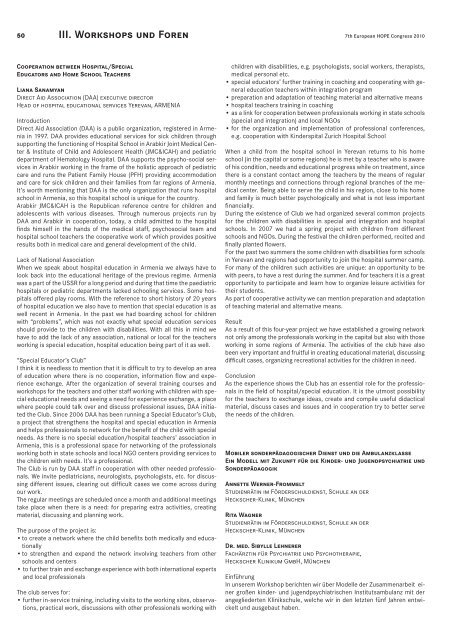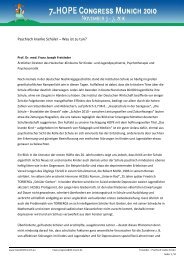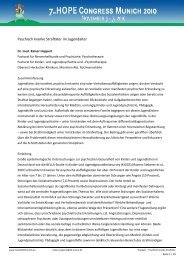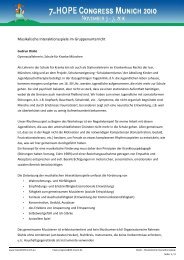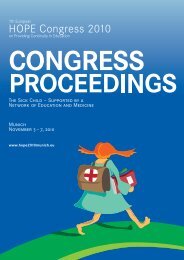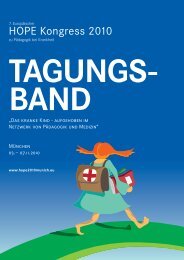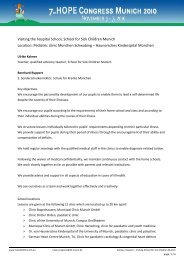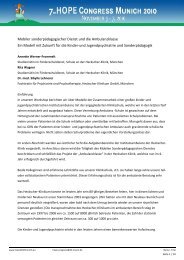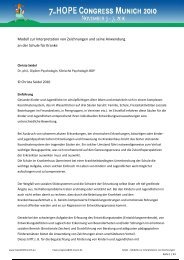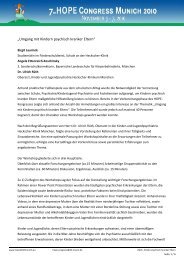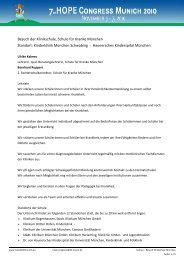HOPE Kongress 2010 - Hope Congress Munich 2010
HOPE Kongress 2010 - Hope Congress Munich 2010
HOPE Kongress 2010 - Hope Congress Munich 2010
Erfolgreiche ePaper selbst erstellen
Machen Sie aus Ihren PDF Publikationen ein blätterbares Flipbook mit unserer einzigartigen Google optimierten e-Paper Software.
III. Workshops und Foren<br />
50 7th European <strong>HOPE</strong> <strong>Congress</strong> <strong>2010</strong><br />
Cooperation between Hospital/Special<br />
Educators and Home School Teachers<br />
Liana Sanamyan<br />
Direct Aid Association (DAA) executive director<br />
Head of hospital educational services Yerevan, ARMENIA<br />
Introduction<br />
Direct Aid Association (DAA) is a public organization, registered in Armenia<br />
in 1997. DAA provides educational services for sick children through<br />
supporting the functioning of Hospital School in Arabkir Joint Medical Center<br />
& Institute of Child and Adolescent Health (JMC&ICAH) and pediatric<br />
department of Hematology Hospital. DAA supports the psycho-social services<br />
in Arabkir working in the frame of the holistic approach of pediatric<br />
care and runs the Patient Family House (PFH) providing accommodation<br />
and care for sick children and their families from far regions of Armenia.<br />
It’s worth mentioning that DAA is the only organization that runs hospital<br />
school in Armenia, so this hospital school is unique for the country.<br />
Arabkir JMC&ICAH is the Republican reference centre for children and<br />
adolescents with various diseases. Through numerous projects run by<br />
DAA and Arabkir in cooperation, today, a child admitted to the hospital<br />
finds himself in the hands of the medical staff, psychosocial team and<br />
hospital school teachers the cooperative work of which provides positive<br />
results both in medical care and general development of the child.<br />
Lack of National Association<br />
When we speak about hospital education in Armenia we always have to<br />
look back into the educational heritage of the previous regime. Armenia<br />
was a part of the USSR for a long period and during that time the paediatric<br />
hospitals or pediatric departments lacked schooling services. Some hospitals<br />
offered play rooms. With the reference to short history of 20 years<br />
of hospital education we also have to mention that special education is as<br />
well recent in Armenia. In the past we had boarding school for children<br />
with “problems”, which was not exactly what special education services<br />
should provide to the children with disabilities. With all this in mind we<br />
have to add the lack of any association, national or local for the teachers<br />
working is special education, hospital education being part of it as well.<br />
“Special Educator’s Club”<br />
I think it is needless to mention that it is difficult to try to develop an area<br />
of education where there is no cooperation, information flow and experience<br />
exchange. After the organization of several training courses and<br />
workshops for the teachers and other staff working with children with special<br />
educational needs and seeing a need for experience exchange, a place<br />
where people could talk over and discuss professional issues, DAA initiated<br />
the Club. Since 2006 DAA has been running a Special Educator’s Club,<br />
a project that strengthens the hospital and special education in Armenia<br />
and helps professionals to network for the benefit of the child with special<br />
needs. As there is no special education/hospital teachers’ association in<br />
Armenia, this is a professional space for networking of the professionals<br />
working both in state schools and local NGO centers providing services to<br />
the children with needs. It’s a professional.<br />
The Club is run by DAA staff in cooperation with other needed professionals.<br />
We invite pediatricians, neurologists, psychologists, etc. for discussing<br />
different issues, clearing out difficult cases we come across during<br />
our work.<br />
The regular meetings are scheduled once a month and additional meetings<br />
take place when there is a need: for preparing extra activities, creating<br />
material, discussing and planning work.<br />
The purpose of the project is:<br />
• to create a network where the child benefits both medically and educationally<br />
• to strengthen and expand the network involving teachers from other<br />
schools and centers<br />
• to further train and exchange experience with both international experts<br />
and local professionals<br />
The club serves for:<br />
• further in-service training, including visits to the working sites, observations,<br />
practical work, discussions with other professionals working with<br />
children with disabilities, e.g. psychologists, social workers, therapists,<br />
medical personal etc.<br />
• special educators’ further training in coaching and cooperating with general<br />
education teachers within integration program<br />
• preparation and adaptation of teaching material and alternative means<br />
• hospital teachers training in coaching<br />
• as a link for cooperation between professionals working in state schools<br />
(special and integration) and local NGOs<br />
• for the organization and implementation of professional conferences,<br />
e.g. cooperation with Kinderspital Zurich Hospital School<br />
When a child from the hospital school in Yerevan returns to his home<br />
school (in the capital or some regions) he is met by a teacher who is aware<br />
of his condition, needs and educational progress while on treatment, since<br />
there is a constant contact among the teachers by the means of regular<br />
monthly meetings and connections through regional branches of the medical<br />
center. Being able to serve the child in his region, close to his home<br />
and family is much better psychologically and what is not less important<br />
financially.<br />
During the existence of Club we had organized several common projects<br />
for the children with disabilities in special and integration and hospital<br />
schools. In 2007 we had a spring project with children from different<br />
schools and NGOs. During the festival the children performed, recited and<br />
finally planted flowers.<br />
For the past two summers the some children with disabilities form schools<br />
in Yerevan and regions had opportunity to join the hospital summer camp.<br />
For many of the children such activities are unique: an opportunity to be<br />
with peers, to have a rest during the summer. And for teachers it is a great<br />
opportunity to participate and learn how to organize leisure activities for<br />
their students.<br />
As part of cooperative activity we can mention preparation and adaptation<br />
of teaching material and alternative means.<br />
Result<br />
As a result of this four-year project we have established a growing network<br />
not only among the professionals working in the capital but also with those<br />
working in some regions of Armenia. The activities of the club have also<br />
been very important and fruitful in creating educational material, discussing<br />
difficult cases, organizing recreational activities for the children in need.<br />
Conclusion<br />
As the experience shows the Club has an essential role for the professionals<br />
in the field of hospital/special education. It is the utmost possibility<br />
for the teachers to exchange ideas, create and compile useful didactical<br />
material, discuss cases and issues and in cooperation try to better serve<br />
the needs of the children.<br />
Mobiler sonderpädagogischer Dienst und die Ambulanzklasse<br />
Ein Modell mit Zukunft für die Kinder- und Jugendpsychiatrie und<br />
Sonderpädagogik<br />
Annette Werner-Frommelt<br />
Studienrätin im Förderschuldienst, Schule an der<br />
Heckscher-Klinik, München<br />
Rita Wagner<br />
Studienrätin im Förderschuldienst, Schule an der<br />
Heckscher-Klinik, München<br />
Dr. med. Sibylle Lehnerer<br />
Fachärztin für Psychiatrie und Psychotherapie,<br />
Heckscher Klinikum GmbH, München<br />
Einführung<br />
In unserem Workshop berichten wir über Modelle der Zusammenarbeit einer<br />
großen kinder- und jugendpsychiatrischen Institutsambulanz mit der<br />
angegliederten Klinikschule, welche wir in den letzten fünf Jahren entwickelt<br />
und ausgebaut haben.


